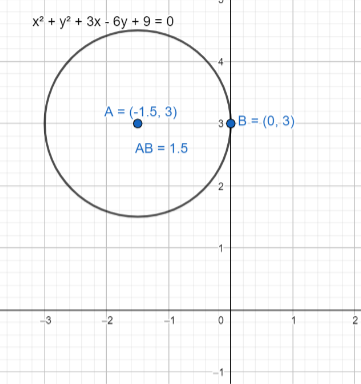Question
Question: \({{x}^{2}}+{{y}^{2}}+3x-6y+9=0\), How can you find the centre, radius, and intercepts?...
x2+y2+3x−6y+9=0, How can you find the centre, radius, and intercepts?
Solution
In this problem we have given the equation of the circle and asked to find the centre, radius and the intercepts of the circle. From this we will convert the given equation in form of (x−h)2+(y−k)2=r2, where (h,k) is the centre of the circle and r is the radius of the circle. To convert the given equation, we will first rearrange the terms so that all the x variables are at one place and all the y variables are at one place. Now we will follow the method of completing squares and simplify the equation to convert it into required form. After converting the equation, we can write the centre and radius of the circle. Now we will calculate the intercepts by substituting x=0, y=0 in the circle equation and calculate the intercepts.
Complete step by step solution:
Given equation of the circle is x2+y2+3x−6y+9=0.
Rearranging the terms in the above equation, so that all the x variable are at one place and all the y variables are at one place. Hence the above equation is modified as
⇒(x2+3x)+(y2−6y)+9=0
Performing the completing squares method in the above equation, then we will get
⇒(x2+2×23x)+(y2−2×3y)+9=0
Adding and subtracting the terms (23)2, 32 in the above equation, then we will get
⇒(x2+2×23x)+(y2−2×3y)+9+(23)2−(23)2+32−32=0⇒(x2+2×23x+(23)2)+(y2−2×3y+32)+9−49−9=0
Applying the algebraic formulas (a+b)2=a2+2ab+b2, (a−b)2=a2−2ab+b2 in the above equation, then we will get
⇒(x+23)2+(y−3)2=(23)2
Comparing the above equation with (x−h)2+(y−k)2=r2, then we will get
−h=23⇒h=−23 , −k=−3⇒k=3 , r2=(23)2⇒r=23
Hence the centre of the circle is (h,k)=(−23,3), radius is r=23.
Calculating the intercepts of the circle.
For y-intercept substituting x=0, in the equation of the circle, then we will get
⇒(0+23)2+(y−3)2=(23)2⇒49+(y−3)2=49⇒(y−3)2=0⇒y=3
We have only one y-intercept value that means the circle do not intercept the y−axis. It only touches the y−axis.
For x- intercept substituting y=0, in the equation of the circle, then we will get
⇒(x+23)2+(0−3)2=(23)2⇒x2+3x+49+9=49⇒x2+3x+9=0
Discriminant of the above quadratic equation is
b2−4ac=32−4(1)(9)⇒b2−4ac=9−36⇒b2−4ac=−27
From the above value we can say that the quadratic equation has no real solution, so there is no x−intercept for the circle. Now the graph of the circle will be

Note: We can also calculate the centre of the circle which is in form of ax2+by2+2gx+2fy+c=0 is given by (−ag,−bf). So, we will compare the given equation with the ax2+by2+2gx+2fy+c=0 and then write the centre of the circle.
